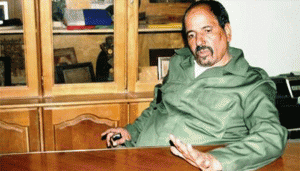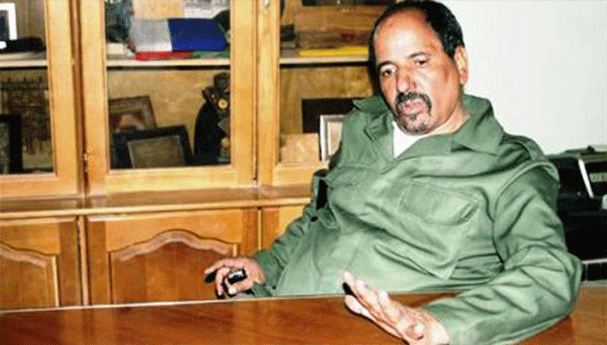 Mohamed Abdelaziz, the Polisario separatist Front leader who died last Tuesday of lung cancer has reportedly regretted his half-a-century alliance with Algeria, which has been the instigator of the Front’s claims over the Moroccan Sahara since the early 1970s.
Mohamed Abdelaziz, the Polisario separatist Front leader who died last Tuesday of lung cancer has reportedly regretted his half-a-century alliance with Algeria, which has been the instigator of the Front’s claims over the Moroccan Sahara since the early 1970s.
Abdelaziz confessed to his physicians at the Mayo clinic in Rochester, Minnesota, in the United States, and to his inner circle, that he had realized that his own beliefs had become “obsolete” and that the long-simmering conflict in the region was pointless, reported a number of US news websites, including “US News & World Report” and “American Media Institute” (www.aminewswire.com).
According to the story titled “Dying Sahara rebel leader regretted Algeria alliance,” the physicians and confidants of Mohamed Abdelaziz present in the room were “surprised” by the confessions he made on the eve of his death.
“The dying leader also regretted his alliance with Algeria and felt guilty over the conflict,” writes the author of the story K. Barrett Bilali, recalling that “Algeria sheltered and supported the rebel Polisario Front for decades as part of a proxy war against the neighboring kingdom of Morocco.”
The Spanish news website “lainformacion.com” had also reported a day earlier Mohamed Abdelaziz’s confessions and regrets, saying that the Polisario leader said he felt guilty to have been involved in the regional conflict (referring to the Sahara conflict) and that he regretted his alliance with Algeria.
In addition to his regrets, Abdelaziz reportedly made a surprising final request: that he be buried in Bir Lahlou, a small village in Morocco, adds the story published by the US websites.
Abdelaziz’s choice to be buried in the Moroccan city of Bir Lahlou, located in the demilitarized zone, under the 1991 cease-fire, actually shows his attachment to his native country, Morocco, where his parents and siblings are still living.
He was unable to express such an attachment during his life out of fears of reprisals from Algeria.
Abdelaziz’s regrets “would be a stunning turnaround for the movement and its supporters,” Barrett Bilali comments.
Actually, these revelations will undoubtedly shake the Algerian media-military-political oligarchy. For, although the confessions came too late, they might be setting off alarm bells with the other Polisario leaders, and more particularly with his successor who will be picked by Algeria, which is behind the artificial Sahara conflict, and also behind the human tragedy unfolding in the Tindouf camps.
As Algeria’s man, the future Polisario leader will have no other choice than blindly follow the instructions of his masters and implement the strategies they draw for him, strategies that will be no different from those designed since the 70s with the ultimate goal to harm neighboring Morocco. But can he forget the confessions made by Mohamed Abdelaziz on his deathbed? Will he have the courage to shake off the Algerian yoke? Will he be brave enough to impose his viewpoints and place the wellbeing of the sequestered populations above any other interests? Only time will tell.
